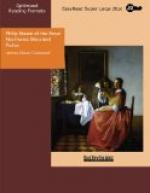With a cry, in which there was mingled all the passion and gloating joy of triumph, Hodges caught her in his arms. In that moment every vein in Philip’s body seemed flooded with fire. He saw the woman’s face again, now tense and white in an agony of terror, saw her struggle to free herself, heard the smothered cry that fell from her lips. For the first time he strained to free himself, to cry out through the thick bandage that gagged him. The box trembled. His mightiest effort almost sent it crashing to the floor. Sweating, powerless, he looked again through the narrow slit. In the struggle the woman’s hair had loosened, and tumbled now in shining masses down her back. Her hands were gripping at Hodges’ throat. Then one of them crept down to her bosom, and with that movement there came a terrible, muffled report. With a groan the chief staggered back and sank to the floor.
For a moment, stupefied by what she had done, Thorpe’s wife stood with smoking pistol in her hand, gazing upon the still form at her feet. Then, slowly, like one facing a terrible accuser, she turned straight to the coffin box. The weapon that she held fell to the floor. Without a tremor in her beautiful face she went to one side of the room, picked up a small belt-ax, and began prying off the cover to Philip’s prison. There was still no hesitation, no tremble of fear in her face or hands when the cover gave way and Philip stood revealed, his face as white as her own and bathed in a perspiration of excitement and horror. Calmly she took away the cloth about his mouth, loosened the straps about his legs and arms and body, and then she stood back, still speechless, her hands clutching at her bosom while she waited for him to step forth.
His first movement was to fall upon his knees beside Hodges. He bowed his head, listened, and held his hand under the man’s waistcoat. Then he looked up. The woman was bending over him, her eyes meeting his own unflinchingly.
“He is dead!” he said quietly.
“Yes, my brother, he is dead!”
The sweet, low tones of the woman’s voice rose scarcely above a whisper. The meaning of her words sank into his very soul.
“My sister—” he repeated, hardly knowing that the words were on his lips. “My—”
“Or—your wife,” she interrupted, and her hand rested gently for a moment upon his shoulder. “Or your wife—what would you have had her do?”
Her voice—the gentleness of her touch, sent his mind flashing back to that other tragic moment in a little cabin far north, when he had almost killed a man, and for less than this that he had heard and seen. It seemed, for an instant, as though the voice so near to him was coming, faintly, pleadingly, from that other woman at Lac Bain—the woman who had almost caused a tragedy similar to this, only with the sexes changed. He would have excused Colonel Becker for killing Bucky Nome, for defending his own honor and his wife’s. And here—now—was a woman who had fought and killed for her own honor, and to save her husband. His sister—his wife— Would he have had them do this? Would he have Mrs. Becker, the woman he loved, defend her honor as this woman had defended hers? Would he not have loved her ten times—a hundred times—more for doing so?




